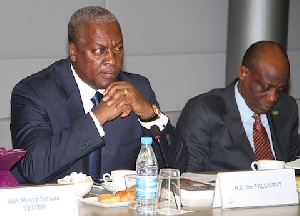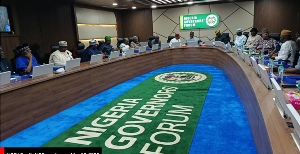This past weekend the expected happened: President Mahama gave the go-ahead for talks to begin with the International Monetary Fund (IMF) on a new programme for Ghana, two years after the country completed its last stabilisation programme with the Bretton Woods lender.
The government never ruled out going to the Fund for assistance to tackle the economy’s problems, although it had always insisted it would try its own “home-grown” solutions first before considering whether a bail-out would be necessary.
But the cedi’s destructive and persistent slide gradually weakened the resolve to avoid IMF intervention, and Seth Terkper, the Finance Minister, said unequivocally during the weekend that the currency’s depreciation is the main reason the IMF has been called in to help.
Privately, many economists were already telling the Business & Financial Times (B&FT) that the country had reached a point where it needed the Fund’s help to stabilise the cedi, boost confidence in its policies and accelerate the journey to restore economic stability.
The Fund has a history of delivering such benefits – but always at very great cost. It is this cost that must now be negotiated following the President’s directive to his advisors “to open discussions with the IMF and other development partners in support of our programme for stabilisation and growth.”
The IMF has already given an inkling of what it would do to heal the economy if it were making the decisions. In its May country report, it proposed a “menu of additional short-term adjustment measures” after saying that “in light of Ghana’s significant fiscal and external balances, government [should] target a larger and more frontloaded fiscal consolidation.”
Essentially, the Fund called for higher taxes and spending cuts to reduce the budget deficit more quickly. Its recommendations include higher ad valorem tax or VAT on fuel; hikes in excise taxes; higher taxes on real estate; a freeze on new tax exemptions; and more robust assessment of large taxpayers to generate more revenues from them.
On the expenditure side, it proposed streamlining of allowances to reduce the wage bill; workforce reduction in overstaffed areas of the public sector; and a decrease or elimination of oil-revenue transfers to the Ghana National Petroleum Corporation (GNPC).
The Fund also implied that the development budget would have to be slashed when it asked for “prioritisation of capital spending combined with reduction in transfers to statutory funds to lowest permissible level.”
These extra measures, according to the Fund, will contain government borrowing and cause the budget deficit to contract to 8.5 percent of GDP in 2014, 6.3 percent in 2015, and a more sustainable 4.5 percent of GDP in 2016.
One would naturally expect some economic growth to be sacrificed if such measures were taken. However, the Fund’s analysis seems to contradict this expectation. Rather than slowing down economic growth, the IMFs projection is that GDP will rise relatively faster if adjustment occurs more quickly.
It argues its case thus: “In the short run, growth will be subject to two offsetting factors, with the contractionary impact of fiscal consolidation assumed to be fully neutralised by the positive impact of lower interest rates and contained depreciation. In the medium term, the positive impact is expected to dominate, resulting in higher growth and significantly lower debt and debt-service ratios.”
It is easier to accept the Fund’s medium-term prognosis than its claim that short-term stabilisation of the kind it proposes will be growth-neutral. This issue is likely to be a subject of debate between government and the Fund when they start discussions on the programme.
Mr. Terkper has said government will tailor the programme to the country’s middle-income aspirations and that they will seek concessions from the Fund during negotiations. Such remarks hint at the government’s desire to secure sufficient economic growth that supports job-creation and adequate public investment even as it pursues stabilisation.
It is certainly good to assume this balanced position. The reality, however, is that both sides will eventually make concessions to agree on a programme.
The IMF gave further advice in May on medium-term fiscal policies, including calling for a legislative revision to streamline tax exemptions such as those granted to free-zones companies. It also asked government to bring back to the table the controversial windfall profit tax for the mining industry.
Its medium-term expenditure proposals include a programme for public sector retrenchment and multi-year wage agreements; cutting off subvented agencies from the public payroll; legislative changes to relax transfer rules for statutory funds; and acceleration of financial management reforms.
At the moment the question on most people’s minds would be whether a Fund bailout will improve the economic situation from now on. The simple answer is that it is not a given. The reason is that in the short term the Fund’s prescriptions would cause some pain and provoke political-economy repercussions whose impact cannot be fully assessed now.
The big hope is that the imprimatur of the IMF will bring back lost confidence in the government’s policies, and that both confidence in the economic outlook as well as the financial assistance that will flow from the programme will reduce pressures on the cedi and create the stability necessary to undertake fundamental reforms.
Business News of Tuesday, 5 August 2014
Source: B&FT













